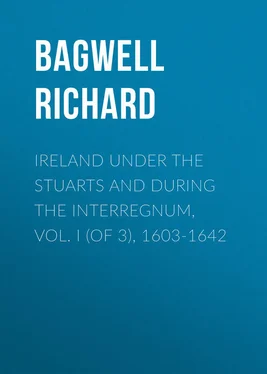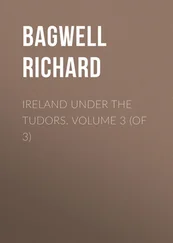Richard Bagwell - Ireland under the Stuarts and during the Interregnum, Vol. I (of 3), 1603-1642
Здесь есть возможность читать онлайн «Richard Bagwell - Ireland under the Stuarts and during the Interregnum, Vol. I (of 3), 1603-1642» — ознакомительный отрывок электронной книги совершенно бесплатно, а после прочтения отрывка купить полную версию. В некоторых случаях можно слушать аудио, скачать через торрент в формате fb2 и присутствует краткое содержание. Жанр: foreign_antique, foreign_prose, на английском языке. Описание произведения, (предисловие) а так же отзывы посетителей доступны на портале библиотеки ЛибКат.
- Название:Ireland under the Stuarts and during the Interregnum, Vol. I (of 3), 1603-1642
- Автор:
- Жанр:
- Год:неизвестен
- ISBN:нет данных
- Рейтинг книги:4 / 5. Голосов: 1
-
Избранное:Добавить в избранное
- Отзывы:
-
Ваша оценка:
- 80
- 1
- 2
- 3
- 4
- 5
Ireland under the Stuarts and during the Interregnum, Vol. I (of 3), 1603-1642: краткое содержание, описание и аннотация
Предлагаем к чтению аннотацию, описание, краткое содержание или предисловие (зависит от того, что написал сам автор книги «Ireland under the Stuarts and during the Interregnum, Vol. I (of 3), 1603-1642»). Если вы не нашли необходимую информацию о книге — напишите в комментариях, мы постараемся отыскать её.
Ireland under the Stuarts and during the Interregnum, Vol. I (of 3), 1603-1642 — читать онлайн ознакомительный отрывок
Ниже представлен текст книги, разбитый по страницам. Система сохранения места последней прочитанной страницы, позволяет с удобством читать онлайн бесплатно книгу «Ireland under the Stuarts and during the Interregnum, Vol. I (of 3), 1603-1642», без необходимости каждый раз заново искать на чём Вы остановились. Поставьте закладку, и сможете в любой момент перейти на страницу, на которой закончили чтение.
Интервал:
Закладка:
In Connaught Clanricarde had been made Lord President for his services at Kinsale, and no doubt his influence had been increased by his marriage to Essex’s widow. He was in England at the end of 1605, and Sir Robert Remington, the Vice-President, made some show of proceeding like Brouncker. Mandates were issued and a few fines imposed upon citizens of Galway, but these were not fully paid, and there is no evidence that anything was done outside that single town. 24 24 Brouncker to Cecil, August 23, 1604; observation by Sir John Davies, May 4, 1606; Lord Deputy and Council to the Privy Council, September 12, 1606; Brouncker to the Privy Council, February 10, 1606-7. For Connaught see preface to State Papers, Ireland , 1606-1608, p. 46.
A petition against interference ‘with the private use of their religion and conscience’ was presented to the Lord Deputy, and signed by two hundred and nineteen gentlemen of the Pale, of whom five were peers. The principal framer of this document was probably Henry Burnell, the lawyer, who was now very old, but who was still the same man who had opposed Sidney thirty years before, and Richard Netterville, who had then been his colleague. The chief promoter was Sir Patrick Barnewall, who was Tyrone’s brother-in-law, and from whose house of Turvey the northern chief had eloped with Mabel Bagenal in 1591. According to Carew, he was ‘the first gentleman’s son of quality that was ever put out of Ireland to be brought up in learning beyond the seas.’ The petition was presented to Chichester by Sir James Dillon and others during the last days of November, and an answer was soon pressed for. The movement being evidently concerted, and Catesby’s plot being very recent, Burnell and Netterville were restrained in their own houses on account of their infirmity, while Barnewall, Lord Gormanston, Dillon, and others were imprisoned in the Castle. Gormanston and three other peers forwarded a copy of the petition to Salisbury, and complained bitterly of the severe measures which had been taken against the aldermen for no offence but absence from the Protestant service. With something of prophetic instinct Barnewall expressed a fear that the Irish Government were laying the foundation of a rebellion, ‘to which, though twenty years be gone, the memory of those extremities may give pretence.’ Most of the prisoners were soon released on giving bonds to appear when called upon, but Barnewall had to go to England. 25 25 Chichester to Salisbury, December 7 and 9, 1605; petition by the nobility and gentry of the English Pale, No. 593; Lords Gormanston, Trimleston, Killeen, and Howth to Salisbury, December 8; Davies to Salisbury, No. 603; Barnewall to Salisbury, December 16. Carew’s Brief Relation of passages in the Parliament of 1613 in Carew .
What we mean by toleration was nowhere understood in the early part of the seventeenth century. Even Bacon, who admired the edict of Nantes, which had not wiped out the memory of St. Bartholomew, had no idea of abrogating the Elizabethan penal code. Henry IV.’s famous edict was an exception; it was one of the kind that proves the rule, for he saw no way of securing the French Protestants but by giving them a kind of local autonomy which could not last. Rochelle was an impossibility in a modern state, and when that frail bulwark was destroyed persecution gradually resumed its sway. Of Spain, the birthplace and fixed home of the Inquisition, it is unnecessary to speak. In Germany neither party practised any real toleration. In Italy Spanish interests were dominant, and Elizabeth died an excommunicated Queen. Clement VIII. abstained from treating her successor in the same way, but he had hopes by mildness to obtain better terms for the faithful in England. Both in England and Ireland any intention of forcing men’s consciences was always disclaimed, while outward conformity was insisted on. And in the case of the Roman Catholics, who took their orders from a foreign and hostile power, it was really very difficult to say exactly how much belonged to Cæsar. Bacon was more liberal than anyone else, but his ideas fell very far short of what is now generally accepted. In Ireland, he advised Cecil, after the Spaniards had been foiled at Kinsale, ‘a toleration of religion (for a time not definite), except it be in some principal towns and precincts, after the manner of some French edicts, seemeth to me to be a matter warrantable by religion, and in policy of absolute necessity. And the hesitation in this point I think hath been a great casting back of the affairs there. Neither if any English Papist or recusant shall for liberty of his conscience transfer his person, family, and fortunes thither do I hold it a matter of danger, but expedient to draw on undertaking and to further population. Neither if Rome will cozen itself, by conceiving it may be some degree to the like toleration in England, do I hold it a matter of any moment, but rather a good mean to take off the fierceness and eagerness of the humour of Rome, and to stay further excommunications or interdictions for Ireland.’ Bacon saw the difficulty clearly, and perhaps he saw the working solution, but to persevere steadily in such a course was not in James’s nature, though Chichester might conceivably have done so if he had had a free hand. 26 26 Letter to Cecil, 1602, Spedding , iii. 49.
Sir Patrick Barnewall was committed prisoner to the Castle on December 2, 1605. ‘Well,’ said he, ‘we must endure as we have endured many other things, and especially the miseries of the late war.’ ‘No, sir,’ answered Chichester, ‘we have endured the misery of the war, we have lost our blood and our friends, and have indeed endured extreme miseries to suppress the late rebellion, whereof your priests, for whom you make petition, and your wicked religion, was the principal cause.’ In writing to Salisbury afterwards Sir Patrick attributed the invention of the mandates to Chief Justice Ley, but it is much more likely that Davies was their author. After an imprisonment of three months, Barnewall was again brought before the Irish Council, and argued soundly in maintaining that recusancy was only an offence in so far as it was made one by statute, and that therefore all prosecution of it except that prescribed by Act of Parliament was illegal. At a further examination when the Chancellor, who was a bishop and ought to have known better, spoke of the King’s religion, Barnewall saw his advantage and exclaimed ‘That is a profane speech.’ He was not sent to England till near the end of April, and at the end of May the English Government had not yet found time to attend to him. At first he was allowed to live under restraint at his own lodgings in the Strand, but was afterwards sent to the Tower, probably with the idea of making an impression upon the public mind in Ireland. It was found impossible to answer his arguments, and the Privy Council asked the Irish Government for information as to the ‘law or precedent for the course taken in issuing precepts under the Great Seal to compel men to come to church.’ They admitted that such authority was ‘as yet unknown to them,’ but rather sarcastically supposed that the Lord Deputy and Council were better informed. The Irish Government were acting entirely by prerogative; but several of the judges in England pronounced the mandates not contrary to precedent or authority. Barnewall was induced to make some sort of submission more than a year after his original arrest. Being called upon to make one in more regular form he refused, and was then sent to the Fleet prison for a month. Having signed a bond to appear within five days of his arrival, he was returned to Ireland at the beginning of March, 1607, and Chichester at once saw that no progress had been made.
Читать дальшеИнтервал:
Закладка:
Похожие книги на «Ireland under the Stuarts and during the Interregnum, Vol. I (of 3), 1603-1642»
Представляем Вашему вниманию похожие книги на «Ireland under the Stuarts and during the Interregnum, Vol. I (of 3), 1603-1642» списком для выбора. Мы отобрали схожую по названию и смыслу литературу в надежде предоставить читателям больше вариантов отыскать новые, интересные, ещё непрочитанные произведения.
Обсуждение, отзывы о книге «Ireland under the Stuarts and during the Interregnum, Vol. I (of 3), 1603-1642» и просто собственные мнения читателей. Оставьте ваши комментарии, напишите, что Вы думаете о произведении, его смысле или главных героях. Укажите что конкретно понравилось, а что нет, и почему Вы так считаете.












